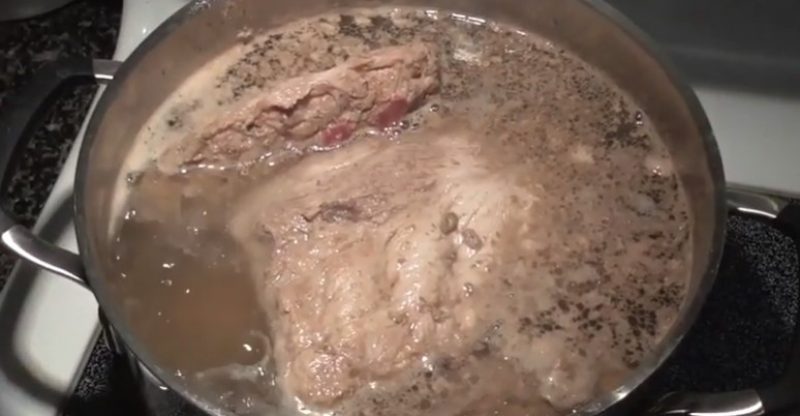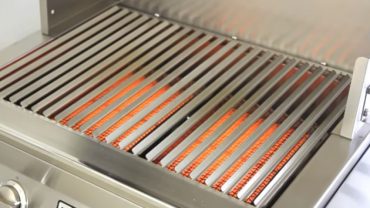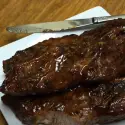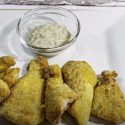How Long To Boil Ribs Before Putting On Grill
How Long To Boil Ribs Before Putting On Grill
How Long To Boil Ribs Before Putting On Grill? Every cook has a favorite spareribs barbecue recipe. But it’s not only the sauce, rub, or how you cook it that makes a good barbecue. It also depends on how you cook your meat.
Boiling ribs before putting them on the grill is a typical procedure that many cooks have followed for many years. But, most importantly, how long should you boil ribs before grilling them? Continue reading to learn more.
What Is The Difference Between Parboiling And Cooking
Parboiling ribs entails submerging them in barely boiling water for three to four hours before grilling. This procedure serves two purposes:
- For starters, it removes part of the fat from the surface of ribs with high-fat content.
- It aids in loosening the meat’s inner skin, which you must remove before grilling.
This strategy has its own set of advantages and disadvantages, which we’ll go through later. It will, without a doubt, come down to personal preference and taste. Nonetheless, having a better grasp of why ribs are boiled before grilling and how this affects the meat is always a good idea.
How Long Do You Boil Ribs Before Grilling Them
The time it takes to cook ribs on a grill varies depending on the grill and the type of ribs. As a result, a precise cooking time for a rack of ribs does not exist.
If you stick to the typical grill temperature range, medium-sized meat should be ready in around 3 hours. Cooking time for smaller ribs should be around two hours. A thick slab of ribs should be cooked for 4 hours, whereas a thick slab with a vertical rack should be cooked for 30 minutes to an hour longer.
Ingredients To Pre Boil Ribs Before Grilling
- 1 rack of ribs, baby back
- 12 cup pork rub spice (see below for a recipe)
- 1 cup unsweetened apple juice
- 12 cup orange marmalade (peach preserves or apricot preserves)
- 14 tablespoons apple cider vinegar
- 1 large one-time-use aluminum tray
- metal foil made of aluminum
If you’re serving the ribs at a barbecue or outdoor event, keep them warm by placing them in an oven or covered grill that has been heated to 250-275 degrees Fahrenheit.
Procedure To Boil Ribs Before Grilling
- Take the pork ribs out of their package and blot them dry using a paper towel. Spray or grease the aluminum pan with non stick frying spray. In a pan, brown the ribs. Remove the silver skin from the ribs’ backside.
- Season the back of the ribs with some of the pork rub’s spice. There’s a reason it’s called ‘rub.’ As a consequence, rub and push it in as much as you can. Note: If you want to make the rib rack simpler to manage on the grill, split it in half.
- Season the other side of the ribs as well. The rule of thumb for rubbing seasoning is to apply only what naturally clings to the ribs. Anything that comes off after rubbing it in should be discarded. Fill the pan halfway with apple juice. Refrigerate the pan, covered with aluminum foil, until ready to grill.
- Preheat the grill to 300 degrees Fahrenheit. Maintain this temperature throughout the cooking procedure to avoid overcooking your ribs. I have three burners and normally turn off the middle one while leaving the two ends on low to create a lovely, low, indirect heat for the ribs.
How To Cook Ribs In The Oven And On The Grill
Step One
In a large stockpot, place your rack of ribs. Fill it halfway with cold water to cover it. Squeeze the lemons in a basin, then drain the juice into the saucepan. You may also use the rinds of lemons, but be sure to remove the seeds first.
Step Two
Season it with salt, bay leaves, and peppercorns. Bring it to a boil after that. Enable the meat to cook until it is slightly tender but not falling apart.
Step Three
Get your grill ready.
Step Four
Grill the parboiled ribs for at least 10 minutes, with the meatier side down on the grill. Grill for another 3 minutes after brushing with your favorite sauce or glaze.
The internal temperature of your succulent ribs should be about 165 degrees Fahrenheit. Similarly, you don’t want the ribs to burn, but you want them to come apart.
Boiling Ribs Before Grilling Has Its Advantages
Because ribs contain a lot of fat, many chefs either parboil them for a brief time or boil them for extended lengths of time to tenderize them. This will render some of the oi on the surface while also making it simpler to remove the interior skin before grilling.
Additionally, doing this extra step might assist cut down on grilling time. The ribs are then finished cooking on the barbecue, usually with a sauce of your choosing. In addition, several recipes specify that the ribs be cooked for at least an hour.
This will drastically reduce the total duration it takes to grill it. Furthermore, cooking ribs for an extended period softens all connective tissues. As a consequence, you’ll be able to savor grilled ribs that are considerably more tender. Keep in mind that instead of cooking the spareribs at a full boil for extended lengths of time, it’s critical to simmer them. This is because the heat from the boil might make the meat tough and dry.
Boiling Ribs Has Its Disadvantages
Aside from reducing fat, boiling ribs before grilling releases the meat’s natural fluids, essential for maintaining the meat’s true taste. Although parboiling does not remove much of the natural taste, the ribs lose some.
On the other hand, simmering for an hour means the ribs will lose a lot of their natural taste. You may taste it in the water, which can be used as a broth in various recipes or cuisines. Ribs are frequently coated or served with a sauce. Despite this, the natural liquids lost by the ribs while boiling might cause the meat to dry out.
Conclusion
The basic answer to how long to boil ribs before grilling depends on your own choice and flavor. But, in general, you submerged it in water for 3 to 4 minutes. You may also cook it for a longer period to make it more tender. However, keep in mind that the ribs will lose a lot of their natural taste due to this. Nonetheless, you’ll have some broth leftover to use in other meals.









